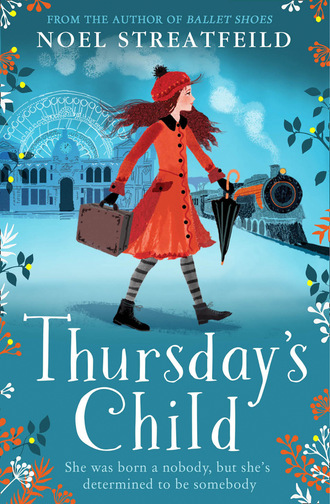
Полная версия
Thursday’s Child
Margaret sat up and looked down the dormitory. There was not much light because the curtains were drawn, but peering over the twenty-five beds which lined each wall she could see at the far end of the room a mattress on the floor covered, as were the beds, with a grey blanket. ‘That,’ she thought, ‘must be Lavinia. I bet she won’t mind if I wake her up.’
To think of something meant for Margaret doing it immediately. In a second she was out of her bed and, holding up her long greyish nightgown, was running down the dormitory. She sat down by the hump under the blanket which was Lavinia.
‘Lavinia! Lavinia! Wake up. It’s me. Margaret. What shall I do? I can’t stay in this dreadful place. You won’t leave Peter or Horatio here, will you?’
Lavinia had the gift of waking up clear-headed.
‘You’d better go back to your bed,’ she whispered. ‘I’m sure you aren’t allowed to be here.’
Up went Margaret’s chin.
‘I don’t care. I’m doing no harm. Did you hear what I said? I’m running away. I can’t stop here.’
Lavinia sat up.
‘I’m only going to be here for two days. I’m to be scullery maid for somebody called the Countess of Corkberry.’
‘Two days!’ said Margaret. ‘I thought you said a week.’
‘I did, and that’s what I hoped, but it’s not to be, but I’ll be back every other Sunday.’
‘They said you could?’
Lavinia spoke with quiet authority.
‘Either I have every other Sunday or I won’t work for the Countess.’
Margaret looked approving. That was the way to talk.
‘I wish I could be a scullery maid. I’m a good cook and it’s sure to be better than being here because it couldn’t be worse.’
‘Well, you can’t be,’ said Lavinia, ‘you’re too young. You would have to pass a labour exam before you could go out to work. I quite see that you want to run away, but please stick it out for a bit. You see, I want you to keep an eye on Peter and Horatio.’
Margaret weakened. She wanted to leave that morning. But perhaps she could bear a week or two, especially knowing Lavinia would come back every other Sunday.
‘Well, I might stick it out for a bit, but …’
Margaret got no further for Miss Jones had flung open the door and was clanging a huge bell. She stopped in mid-clang, her mouth gaping, unable to believe what her eyes told her.
‘Margaret Thursday! What are you doing out of your bed?’
Margaret got to her feet.
‘Talking to Lavinia. She’s my friend.’
‘Go back to your bed at once,’ Miss Jones thundered. Then she gave another clang on the bell. ‘Up, girls, up. Form a line for the washroom.’ She looked again at Margaret, who had not moved. ‘Now what is it?’
‘You said I was to go back to bed. Then you said “Up, girls, up”, and now you say form a line for the washroom. What do you want me to do?’
Miss Jones was more sure than ever that she did not like Margaret Thursday.
‘You will get your toothbrush and mug and join that line there for the washroom.’
It was a slow shuffling walk to get washed, made the more dismal by the shrieks of the small children who were being washed by Miss Jones and an assistant.
‘They put soap in their eyes,’ a small girl who was in front of Margaret told her. ‘It happens every day. It used to happen to me.’
‘Beasts!’ said Margaret.
Lavinia, who had taken her place behind Margaret, whispered:
‘I do hope Peter has managed to wash Horry. He’d kick anyone who put soap in his eyes.’
Margaret found her clothes had disappeared and in their place were her orphanage clothes: a vest, a bodice, coarse long straight-legged drawers, a grey winceyette petticoat, the uniform dress, an apron and a cap. The only thing left of her own clothes were her boots.
‘It would be them,’ she thought resentfully, ‘knowing I always hated them.’ Then there were tears in her eyes. Even the despised boots were something of home.
None of the clothes were new and none fitted, but Margaret was given some good advice by an older girl whom Miss Jones sent to show her how the uniform cap should be worn.
‘Don’t say anything doesn’t fit,’ she whispered, ‘for you’ll be made to alter it yourself in what they call “free time” – we don’t get much of that.’
There was no such thing as a looking-glass in the dormitory, so Margaret could only guess at her appearance. She could see, however, how the others looked and that was enough.
‘My goodness!’ she thought. ‘Suppose Hannah could see me now!’
As a matter of fact, Margaret was wrong. Of course the clothes were a hundred years out of date and they felt ridiculous to her, used to skirts to her knees, but grown-up people thought the orphanage children looked picturesque. The cap really did suit Margaret. It was made of white cotton with a drawstring at the back which held it tightly in position. The children were supposed to strain their hair out of sight under the caps, but Margaret’s curls refused to be controlled and spiralled out round her face.
Breakfast was another depressing meal. Each child had a bowl of lumpy porridge served with a mere splash of milk and no sugar. This was followed by one slice of bread and margarine and a cup of weak tea.
The orphans were not taught in the orphanage but, wrapped in their brown cloaks, they were marched two-and-two down to the village school.
‘At school don’t they laugh at us in these clothes?’ Margaret asked the girl who was paired with her, whose name was Susan.
Susan shook her head.
‘No. They’re used to us, and anyway I think they are sorry for us. Sometimes they give us things. Once I had a whole apple.’
Margaret, used to the large overgrown garden at Saltmarsh House where she could have all the fruit there was for the picking, felt even more depressed. Imagine speaking of an apple like that – something to be remembered!
‘Don’t we ever get fruit at the orphanage?’
‘Oh yes,’ said Susan. ‘Always at Christmas we are given an orange.’
An orange! It was not just that an orange a year was all she was to expect, but Susan’s calm acceptance that outraged Margaret. But she had other questions to ask. One had been worrying her since she had been given her uniform for nobody could run far dressed in it.
‘What do they do with our own clothes?’
Susan looked scared, peering round to see that Miss Jones was not within hearing distance.
‘We don’t know.’
‘But they must be kept somewhere.’
Susan whispered so low that Margaret had to strain to hear.
‘Some of them say Matron sells them.’
‘For herself?’
Susan nodded.
‘But that’s only what they say. We don’t know.’
‘They won’t sell mine,’ said Margaret. ‘I’ll ask Matron for them.’
Susan clutched at Margaret’s arm.
‘Don’t. Just for asking you get a terrible punishment, you could …’
They were outside the school playground. Miss Jones, red-faced, was standing by Susan.
‘What were you saying? You know talking is forbidden.’
Susan might look meek, but she evidently knew how to fool Miss Jones.
‘I was only telling Margaret what work we shall do in school this morning.’
‘Oh!’ Miss Jones turned away. ‘Quick march. Straight to the classrooms, children. No playing in the yard.’
Chapter Six
SCHOOL
A Miss Snelston was head of the village school and from the first the children liked her. It was not easy with only one pupil-teacher to assist her to teach children of all ages in two rooms, but somehow she managed.
Most of the pupils other than the orphans were the children of farm labourers, red-cheeked and solidly built on a diet largely composed of vegetables, eggs, milk and bread, for at that time farm labourers’ wages were very low so meat was a rarity. All the children, urged on by their parents, had one aim which was to pass the labour exam as early as possible so that the girls could go into service and the boys get work on the farms. Miss Snelston, of course, knew this was their ambition and she accepted it. ‘After all,’ she would say to her pupil-teacher, Polly Jenkin, ‘they may as well leave when they are twelve for you and I know, however long we keep them here, very few would learn any more, and of course it’s hard for the parents to find the school money.’ School money was twopence a week, which in those days was paid as school fees.
It was Miss Snelston’s hope each time there was a new batch of orphans that a really intelligent child would turn up. That was how she had found Polly Jenkin. She had taught her since she came to the orphanage at the age of four and had discovered in her a real fondness for learning, so the moment she had passed her labour exam she had applied to the governors for her. She arranged that Polly was to receive two-and-sixpence a month and would live in her cottage, in return for which she would help with the housework.
The school morning started with prayers and a hymn, then, leaving Polly to get the school work started, Miss Snelston called Margaret, Peter and Horatio into her little office and gave them their slates.
‘These are your very own,’ she explained. ‘You must look after them carefully for on them you do your sums and sometimes dictation. My aim is to see four sums right on every slate.’ She smiled at the three children, hiding from them her deep pity for well she knew how hard their lives would be. ‘You,’ she said to Peter, ‘must be Peter Beresford and this must be Horatio.’
Horatio, looking very tiny in his brown uniform, which was at least two sizes too large for him, smiled back at Miss Snelston.
‘That man that washed me put soap in my eyes,’ he told her.
‘I’m sure he did,’ Miss Snelston thought, looking at Horatio’s still bloodshot eyes and tearstained cheeks. She turned up the sleeves of his jacket which entirely hid his hands.
‘Dear me, that suit is very big for you.’ She turned to Peter. ‘Bring him in here in middle morning break and I’ll stitch the sleeves up.’ Then she looked at the trousers flapping round the child’s ankles. ‘Do you think Matron would mind if I shortened the trousers?’
Peter was a good-looking boy with large blue eyes. Now he turned these anxiously to Margaret.
‘Would she mind?’
Margaret felt something she had never felt before. A sort of warm feeling round her heart. All her life people had looked after her, now somebody needed her. It was nice to be needed.
‘I shouldn’t think she’d notice.’
Miss Snelston evidently thought that sensible.
‘You are Margaret Thursday?’
‘That’s right,’ Margaret agreed. ‘It’s not my real surname. You see it was a Thursday when the rector found me. I was in a basket with three of everything packed with me, all of the very best quality. And there was a card which said my name was Margaret and that fifty-two pounds would come every year to keep me – and so it did until last Christmas.’
Miss Snelston would like to have heard more but the school needed her.
‘Can you read and write?’
Margaret thought that a foolish question.
‘Yes.’
Miss Snelston turned to Peter.
‘And you?’
‘Oh yes, of course.’
There was something about the way Peter answered that caught Miss Snelston’s ear.
‘What do you read?’
‘What I can get. Before …’ Peter hesitated, then said: ‘Before we were sent here I was reading David Copperfield.’
Miss Snelston held out a hand to Horatio.
‘You and Margaret can sit next to each other,’ she told Peter. ‘Horatio will be in the next room with the little ones – or can you read too, Horatio?’
Horatio shook his head.
‘But I can draw pictures.’
‘Good,’ said Miss Snelston, longing to give him a hug. ‘If you draw a good picture we will put it up on the wall.’
Back at the orphanage, Lavinia had been sent to what was called the linen room. There on a trestle table were piles of print dresses, aprons and caps made in sewing time by what Miss Jones described as ‘the female orphans’. She held a dress up against Lavinia.
‘Mostly these fit anyone,’ she said. ‘The apron ties them in.’
Lavinia turned the dresses over. ‘There are so many pretty prints in the shops,’ she thought. ‘I wonder why they have to choose such ugly ones.’
‘I think I’ll just take two dresses,’ she said. ‘They’ll do to start with and I can buy some prettier ones later on.’
Miss Jones jumped as if she had been bitten by a snake.
‘Prettier! Prettier! Who do you think you are? Pretty indeed! It is not prettiness that Her Ladyship is expecting from her scullery maid.’
But Lavinia was not easily cowed.
‘Did you never hear the proverb, “He who pays the piper calls the tune”? Just now I am paying the piper and I say I only want two print frocks. I have a black dress and coat which will do for Sundays, but I will take four aprons and caps.’
Miss Jones could have shaken her. It was, she thought, foolish of Matron to have told Lavinia she had to pay for the dresses. Better to have fitted her out and then sent the bill to Lady Corkberry’s housekeeper for payment to be deducted from her wages.
‘Very well,’ she snapped. ‘Take what you want and then follow me. I will show you where you can sew.’
The orphans came home at twelve for their dinner. This was the big meal of the day. A regular amount of food was allowed for each orphan each week and from this ration Matron was supposed to select the meals. But Matron was fond of her food so she made a point of never weighing the meat the butcher sent or the fish from the fishmonger, well knowing she would be rewarded by tasty steaks and delicate soles. As a result the main meal, though eaten to the last lick, usually left the orphans hungry. That day the meal was a stew which should have contained at least a quarter of a pound of meat per child, but in fact was mostly turnips, parsnips and potatoes, with fragments of meat floating around. However, there had been complaints that the children went back to school hungry, so the stew was followed by a slice of suet pudding served with a teaspoonful of treacle. The suet puddings were so solid it was said if you threw one against the wall it would not break up but would bounce back to the thrower.
Margaret and Lavinia succeeded in sitting next to each other and in exchanging a little conversation.
‘The school’s nice,’ Margaret whispered. ‘Miss Snelston turned up Horry’s suit. Nobody can read as well as Peter. We are made to point to each word as we read it.’
‘I’m going tomorrow,’ Lavinia told Margaret. ‘My trunk is coming this afternoon and there are things in it I want to tell you about. I’ll have to wait until everybody is asleep, but I’ll come and talk to you tonight.’
Afternoon school was given up to the lighter subjects. First there was dancing, which Margaret loved, then there was two-part singing and finally drawing. ‘If only it was all school and we never had to go to the orphanage, wouldn’t it be lovely?’ Margaret thought, but soon school was over and Miss Jones was outside shouting ‘Get into line. One two. One two. No talking.’ Sadly, out of the corners of their eyes, the orphans watched the village children laughing and pushing each other about as they ran home to their teas.
For the orphans, work was not over for the day. After tea, which was a slice of bread and margarine and a cup of milk and water, there were what were called ‘tasks’. Some of the girls were sent to sew, others to the kitchen to peel potatoes. For the boys there was wood to cut and bring in and what was called ‘repairs’, which meant mending any piece of furniture which needed it.
The youngest children, of whom Horatio was one, were turned loose during this time to play. There were no toys in the so-called playroom, but the children managed without, so almost at once Horatio was seized on by two small girls who told him he was their little boy for they were going to play ‘Home’. ‘Home’ was an immensely popular game with the smaller children, who could spend hours pretending they were mothers and fathers – creatures few of them had seen.
Margaret, because it was an unpopular task, was sent by Miss Jones to the scullery to peel potatoes. This was supposed to be done in silence, but the cook and her assistant were out so only Winifred was in charge, and of course nobody paid any attention to her. Occasionally she squeaked:
‘Oh, be quiet, do. If Matron was to hear she wouldn’t half wrought me,’ but mostly she kept darting to the scullery door to hear what was going on, for she was only thirteen and had, before Matron took her on to work in the kitchen, been an orphan herself.
Margaret was holding the floor. Apart from the fact that she was new so no one knew her story, she loved an audience and knew how to keep them amused. Of course she told the story of her arrival in a basket, but on this occasion she added a few touches.
‘And every one of my baby clothes was embroidered with – what do you think?’ It was clear the little girls couldn’t think. ‘A coronet. And amongst my baby clothes was a beautiful diamond brooch.’
Susan was amongst the potato peelers.
‘Oh, Margaret, you are a fibber!’
‘I’m not then,’ said Margaret. ‘I’ll write to the rector to tell you it’s true. Then you’ll see.’
‘Who do you think you might be, then?’ another child asked.
Margaret had so often wondered about this she had dozens of suggestions to offer.
‘Well …’ she said, ‘I might be …’ From that night onwards Margaret was established as the queen of storytellers.
Margaret was almost asleep by the time Lavinia felt it safe to come to her bed. She brought with her two books, David Copperfield and A Tale of Two Cities.
‘These are Peter’s. I can’t get them to him as I can’t get into the boys’ dormitory. Anyhow, I don’t believe he’d know how to hide them. Could you?’
‘I can try. I made my tin box into my bed this morning and nobody noticed, but I don’t know if they look sometimes. Really I ought to get them to school, they can be safe in Peter’s desk.’
‘Well, do what you can.’ Lavinia put the books into Margaret’s bed. ‘He must have something to read. He’d rather read than eat. And here,’ she put a piece of paper into Margaret’s hand, ‘is my address. If anything goes really wrong get a message to me there. Perhaps that Miss Snelston would help, she sounds nice.’
Margaret rummaged round and found her tin box and opened it.
‘I’ll keep it in here. I may take this to school. I’ll see. It depends if they search our beds.’
Lavinia found and held Margaret’s hands.
‘Don’t run away, will you? It’s awful enough going off and leaving Peter and Horry, but if you weren’t here I think I’d die.’
‘I won’t run away without telling you, I promise you that. But you will come every other Sunday? Promise.’
Lavinia kissed her.
‘I promise, or at least, if they won’t give me every other Sunday, I’ll find another place to work. I can promise you that.’
‘Good,’ said Margaret. She lay down again and, hugging her box to her, she was soon asleep.
Chapter Seven
LAVINIA
Lavinia drove away the next morning in an estate cart belonging to the Corkberrys. The children did not see her go as they were at school. The young man who drove the cart shouldered her tin box and, though Miss Jones saw her drive away, she neither waved nor smiled. It was a dismal departure.
Lavinia tried hard not to cry but she had to gaze out over the fields so the driver would not see that her eyes were brimming with tears. But if he could not see the young man guessed.
‘Don’t ’ee take on now,’ he said. ‘You’ll like it up to Sedgecombe Place. They be good employers, His Lordship and Her Ladyship. And the grub’s good – far better than you would get in that old orphanage. Cruel hard on the little ’uns they say that be.’
The driver told Lavinia his name was Jem and he worked with the horses. He was a cheerful youth and made Lavinia feel better.
‘Do you think I shall see Lady Corkberry today?’
Jem shook his head.
‘No – not her. There be a Mrs Tanner, she be the one you’ll see. She be the housekeeper. Bit of a dragon seemingly, but they say if you do your work right she’m fair.’
Lavinia’s heart sank. Would Mrs Tanner want to see if she worked well before she promised her every other Sunday?
‘Is it far from Sedgecombe Place – I mean from the orphanage? You see, I want to get back there on my time off, I’ve two little brothers there.’
‘Not far,’ said Jem, ‘maybe four miles – not more. Walk it easy, pretty walk too all along the canal bank.’
Lavinia looked round.
‘I can’t see a canal.’
‘Not from here,’ Jem agreed, ‘but this is canal country, it’s near here where the Shropshire Union Canal runs into the Staffordshire and Worcestershire Canal. I did ought to know for I was born on a canal boat.’
‘Were you? What made you leave it to work at Sedgecombe Place?’
‘The pneumonia,’ Jem explained. ‘Cruel sick I was and down at a place called Autherley my dad had to call the doctor. Well, there wasn’t no hospital near so the doctor told her ladyship about me and she fixed it so I was put to bed in the house. Well, when I was better like, the doctor he said I wasn’t to go back on the canal no more, so that’s how I come to work with the ’orses. I see me dad and mum often enough when they’re passin’. All the way to London my dad goes.’
Lavinia knew nothing about canals. She thought it very odd to be born on a boat.
‘Have you got a lot of brothers and sisters?’
‘Five. Tight squeeze it was when we was all there, but now my eldest brother he has his own boat and the next he give up same as me, then me two sisters got married so now there’s only young Tom left, eleven he is, he leads the horse – not the same one, of course, but the one they give you at the stables.’
‘Doesn’t Tom have to go to school?’ Lavinia asked.
‘No – canal people don’t go to school. I can make me mark because one of the men I work with showed me. Young Tom would have gone to school if he could have been spared, but a course ’e couldn’t be, not with there bein’ nobody else for the ’orse. He don’t like the canal life, Tom don’t. Dad’s dead scared he’ll run off some time.’
‘I must get someone to show me the canal path,’ said Lavinia. ‘It will be nice walking by the water now the spring’s coming.’
‘You’ll see me around,’ Jem promised, ‘and if you tell me when you have time off I’ll put you on your way.’
At the next bend in the road they could see Sedgecombe Place – a grey battlemented building lying in a great park.
‘My word!’ said Lavinia. ‘It is a big place, there must be a lot of servants needed to keep it right.’
Jem whipped up the horse.
‘You’ve said it.’ He did not speak again until he drove the cart through some wrought-iron gates. ‘We go up this path here, it leads to the back door.’
Just as Jem had predicted, Lavinia was taken at once to be interviewed by Mrs Tanner. She was a tall rather severe-looking woman in a black dress with a black silk apron over it. Round her waist was a chain on which hung a bunch of keys. The housekeeper’s room in which she saw Lavinia was, however, cosy, with pretty curtains and primroses in a vase, so perhaps, Lavinia thought, she is gentler than she looks. Mrs Tanner sat upright in a stiff chair while Lavinia stood just inside the door.
‘You are Lavinia Beresford?’
Lavinia curtseyed.
‘Yes, ma’am.’
‘Have you worked in a kitchen before?’
‘No, ma’am. This is my first place.’
‘I see. This is a big place and we all have to work hard. You will receive five pounds a year less what you have had advanced for your uniform. You will share a room with the under kitchen-maid. Between you there will be your room to do and you have to look after the rooms of three footmen. You will rise at six for, as Mrs Smedley the cook will explain, you will have the kitchen range to see to so that the water is hot by the time she comes down. Otherwise your work is to wait on her and, of course, wash up. At night, before you go to bed, there will be the range to blacklead and the kitchen and scullery to hearthstone. At all times you will call Mrs Smedley ma’am. That is all, do your duty and you should be very happy with us.’





